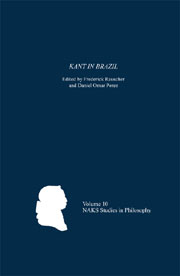Book contents
- Frontmatter
- Contents
- Acknowledgments
- Note on Sources and Abbreviations
- Introduction
- 1 Two Centuries of Kantian Studies in Brazil
- 2 Self-Consciousness and Objective Knowledge in the Transcendental Deduction of the Critique of Pure Reason
- 3 Intuitive Knowledge and De Re Thought
- 4 Predicative Judgments and Existential Judgments: Apropos Kant's Critique of the Cartesian Ontological Argument
- 5 An Experiment with Practical Reason
- 6 On the Faktum of Reason
- 7 Critique, Deduction, and the Fact of Reason
- 8 The Noncircular Deduction of the Categorical Imperative in Groundwork III
- 9 The Distinction between Right and Ethics in Kant's Philosophy
- 10 Right and the Duty to Resist, or Progress toward the Better
- 11 The Fundamental Problem of Kant's Juridical Semantics
- 12 Right, History, and Practical Schematism
- 13 Cosmopolitanism: Kant and Kantian Themes in International Relations
- 14 A Typology of Love in Kant's Philosophy
- 15 The Meaning of the Term Gemüt in Kant
- 16 Between Prescriptive Poetics and Philosophical Aesthetics
- 17 The Purposiveness of Taste: An Essay on the Role of Zweckmässigkeit in Kant's Critique of Aesthetic Judgment
- 18 Freedom in Appearance: Notes on Schiller and His Development of Kant's Aesthetics
- 19 Reading the Appendix to Kant's Critique of the Teleological Power of Judgment
- 20 Symbolization in Kant's Critical Philosophy
- Bibliography of Works in German and English
- List of Contributors
- Index
11 - The Fundamental Problem of Kant's Juridical Semantics
Published online by Cambridge University Press: 05 February 2013
- Frontmatter
- Contents
- Acknowledgments
- Note on Sources and Abbreviations
- Introduction
- 1 Two Centuries of Kantian Studies in Brazil
- 2 Self-Consciousness and Objective Knowledge in the Transcendental Deduction of the Critique of Pure Reason
- 3 Intuitive Knowledge and De Re Thought
- 4 Predicative Judgments and Existential Judgments: Apropos Kant's Critique of the Cartesian Ontological Argument
- 5 An Experiment with Practical Reason
- 6 On the Faktum of Reason
- 7 Critique, Deduction, and the Fact of Reason
- 8 The Noncircular Deduction of the Categorical Imperative in Groundwork III
- 9 The Distinction between Right and Ethics in Kant's Philosophy
- 10 Right and the Duty to Resist, or Progress toward the Better
- 11 The Fundamental Problem of Kant's Juridical Semantics
- 12 Right, History, and Practical Schematism
- 13 Cosmopolitanism: Kant and Kantian Themes in International Relations
- 14 A Typology of Love in Kant's Philosophy
- 15 The Meaning of the Term Gemüt in Kant
- 16 Between Prescriptive Poetics and Philosophical Aesthetics
- 17 The Purposiveness of Taste: An Essay on the Role of Zweckmässigkeit in Kant's Critique of Aesthetic Judgment
- 18 Freedom in Appearance: Notes on Schiller and His Development of Kant's Aesthetics
- 19 Reading the Appendix to Kant's Critique of the Teleological Power of Judgment
- 20 Symbolization in Kant's Critical Philosophy
- Bibliography of Works in German and English
- List of Contributors
- Index
Summary
The Concept of Practical Philosophy in Later Kant
Kant defines a philosopher as “the legislator of human reason” (Pure Reason, B867). The philosopher's legislation has two objects, nature and freedom, and therefore contains both the laws of nature (natural laws) and the laws of freedom (moral laws). The former determine a priori what is and comprise the system of nature; the latter determine a priori what should be and make up the system of freedom. Theoretical or speculative philosophy takes care of the former; practical philosophy takes care of the latter.
In Kant's later writings, practical philosophy is split into a “metaphysics of morals” and a “moral anthropology” (Doctrine of Right, 6:217). The former contains a priori the principles that dispose of “freedom in both the external and the internal use of choice” (Doctrine of Right, 6:214), and for that reason is also called “anthroponomy” (Doctrine of Virtue, 6:406). The latter, moral anthropology, comprises the study of subjective conditions, pertaining to human nature, that are either favorable or contrary to the execution of the laws of practical reason (Doctrine of Right, 6:217).
This distinction is a novelty relative to the first Critique. In the first Critique, Kant contrasts practical philosophy, especially pure morals, which deals with the principles that “determine action and omission a priori and make them necessary,” with anthropology, conceived as an empirical, scientific theory. He says, for example, that “the metaphysics of morals is really the pure morality, which is not grounded on any anthropology (no empirical condition)” (Pure Reason, B869–70).
- Type
- Chapter
- Information
- Kant in Brazil , pp. 206 - 235Publisher: Boydell & BrewerPrint publication year: 2012

